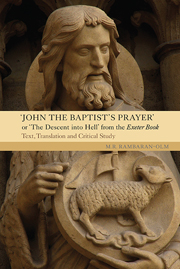 John the Baptist's Prayer 'The Descent into Hell' from the Exeter Book
John the Baptist's Prayer 'The Descent into Hell' from the Exeter Book Book contents
- Frontmatter
- Contents
- Illustrations
- Acknowledgements
- Abbreviations
- Dedication
- Introduction
- 1 Palaeography, Codicology and Language
- 2 The Descensus Motif
- 3 Literary Analysis
- 4 Selected Comparative Studies and Analogous Literature
- Afterword
- Text and Translation
- Commentary
- Appendix 1 The Doctrine of the Descensus according to Post-Apostolic and Medieval Commentators from the First Century to the End of the Eleventh Century
- Appendix 2 Scriptural References
- Appendix 3 Other Sources and Analogues
- Appendix 4 Transcription and Images of fol. 120r
- Glossary
- Biblioigraphy
- Index
1 - Palaeography, Codicology and Language
Published online by Cambridge University Press: 05 August 2014
- Frontmatter
- Contents
- Illustrations
- Acknowledgements
- Abbreviations
- Dedication
- Introduction
- 1 Palaeography, Codicology and Language
- 2 The Descensus Motif
- 3 Literary Analysis
- 4 Selected Comparative Studies and Analogous Literature
- Afterword
- Text and Translation
- Commentary
- Appendix 1 The Doctrine of the Descensus according to Post-Apostolic and Medieval Commentators from the First Century to the End of the Eleventh Century
- Appendix 2 Scriptural References
- Appendix 3 Other Sources and Analogues
- Appendix 4 Transcription and Images of fol. 120r
- Glossary
- Biblioigraphy
- Index
Summary
THE EXETER BOOK MANUSCRIPT
The Exeter Book, also known as manuscript 3501 in the Library of the Dean and Chapter of Exeter Cathedral in Exeter, contains the only extant text of The Descent into Hell or John the Baptist's Prayer. Dating of the manuscript has not gone without controversy, since it has been difficult to date the specific poetic works within the manuscript. Despite this dating controversy the manuscript is generally attributed to the latter half of the tenth century, and codicological and literary evidence suggests that the entire manuscript was both designed and copied c. 965–75. The Exeter Book may very well be ‘the oldest surviving book of vernacular poetry from Anglo-Saxon England’ and has been at Exeter after it was given to the resident Bishop Leofric (1016–72) who moved the Episcopal see to Exeter from Crediton in 1050. Before Leofric's death on 10 February 1072, he requested the compilation of an itemized donation list comprised of books and religious artifacts with the intention of leaving the listed items to Exeter Cathedral and its community. The item listed as -i- mycel englisc boc be gehwilcu(m) Þingu(m) on leoðwisan geworht is, with reasonable certainty, said to be the earliest reference to the Exeter Book, although scholarly identification is not completely conclusive. P. Conner argues that there seems to be a substantial amount of evidence to suggest that the manuscript was written in either Crediton or Exeter.
- Type
- Chapter
- Information
- John the Baptist's Prayer 'The Descent into Hell' from the Exeter BookText, Translation and Critical Study, pp. 11 - 30Publisher: Boydell & BrewerPrint publication year: 2014


